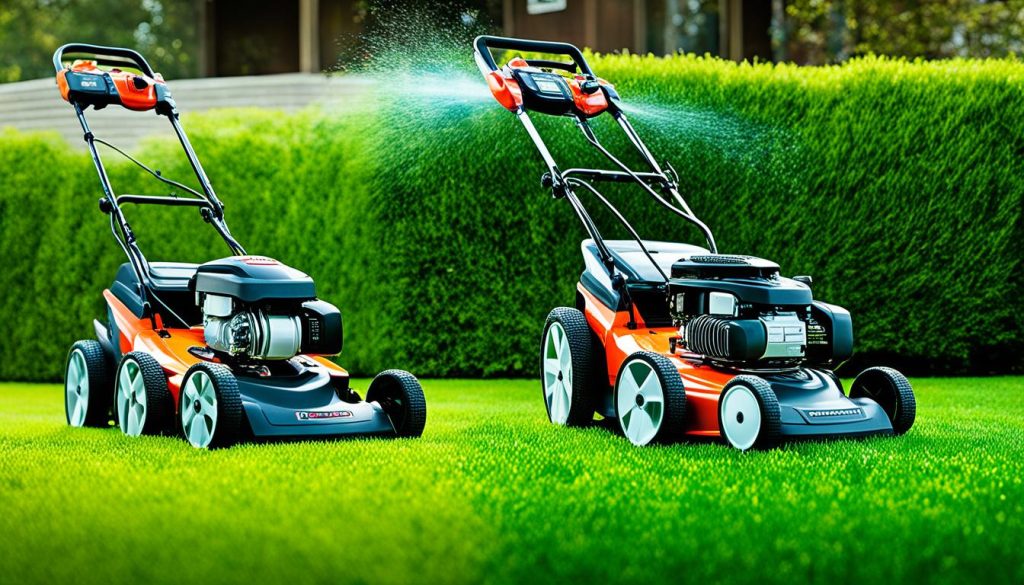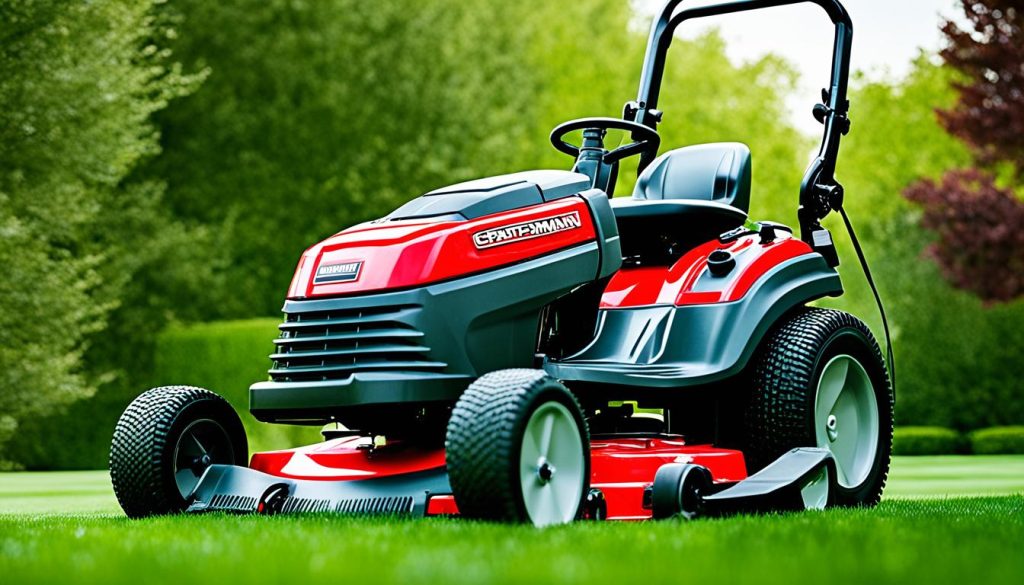Have you ever wondered how loud a lawn mower is? From the buzzing sound of a gas-powered mower to the hum of an electric one, the noise level can vary. But just how many decibels does a lawn mower produce? Let’s explore the world of lawn mower noise and find out the facts.
Key Takeaways:
- Lawn mowers produce varying levels of noise measured in decibels (dBA).
- Gas-powered lawn mowers tend to be louder, with an average noise level of around 95 dBA.
- Electric lawn mowers are generally quieter, producing noise at around 75 dBA.
- Advocacy groups are promoting the use of quieter lawn equipment to reduce noise pollution.
- A quieter lawn mower can contribute to a more peaceful environment and protect against hearing damage.
Noise Levels of Common Equipment
When it comes to assessing the noise levels of common equipment, including lawn mowers, it is crucial to understand the potential impact on our hearing health. The University of Florida’s Hearing Conservation Program provides valuable insights into the decibel levels of various equipment. Below is a table highlighting the noise levels of common equipment, including lawn mowers:
| Equipment | Noise Level (dBA) |
|---|---|
| Riding Lawn Mower | 90 |
| Airboat | 100 |
| Band Saw | 110 |
| Blender | 85 |
| Blower | 90 |
From the table, we can see that riding lawn mowers are measured at 90 dBA. This means that anyone operating a lawn mower with a noise level exceeding 85 dBA should consider using hearing protectors to prevent potential hearing damage.
It is essential to bear in mind these noise levels when utilizing common equipment, especially in scenarios where prolonged exposure may occur. By being aware of the noise emitted by lawn mowers and other equipment, individuals can make informed decisions to protect their hearing health.
Continuing with the discussion on lawn mower noise levels, the next section will delve deeper into the key differences between gas-powered and electric lawn mowers, shedding light on their respective loudness and environmental impact.
Gas-Powered vs. Electric Lawn mowers
When it comes to choosing a lawn mower, one of the key factors to consider is the noise level. Gas-powered lawn mowers are notorious for their loudness, with an average noise level of approximately 95 dBA. This can be compared to the sound of a chainsaw or a motorcycle revving up.
In contrast, electric lawn mowers offer a much quieter mowing experience, with a noise level of around 75 dBA. This is comparable to the noise level of a vacuum cleaner or a running washing machine. The electric motor used in these mowers operates silently, allowing you to maintain your lawn without disturbing your neighbors or causing excessive noise pollution.
Not only are electric lawn mowers quieter, but they also have additional advantages. They are more environmentally friendly as they do not emit harmful fumes or contribute to air pollution like gas-powered mowers do. Electric mowers also require less maintenance, as they do not need oil changes or spark plug replacements, making them more cost-effective in the long run.
For those who prioritize a quieter mowing experience and want to reduce their ecological footprint, electric lawn mowers are an excellent choice. See the table below for a quick comparison of gas-powered and electric lawn mowers:
| Comparison | Gas-Powered Lawn Mowers | Electric Lawn Mowers |
|---|---|---|
| Noise Level | Around 95 dBA | Around 75 dBA |
| Environmental Impact | Emit fumes and contribute to air pollution | Environmentally friendly, produce no emissions |
| Maintenance | Require oil changes and spark plug replacements | No oil changes or spark plug replacements needed |
As seen in the table, electric lawn mowers offer a quieter and more sustainable alternative to their gas-powered counterparts. By choosing an electric mower, you can enjoy a peaceful mowing experience while minimizing your impact on the environment.

Advocacy for Quieter Lawn Equipment
Various organizations and groups, such as Huntington CALM and Noise Free America, are at the forefront of advocating for cleaner and quieter landscape equipment. These advocacy efforts aim to raise awareness about the negative effects of loud lawn equipment on both the environment and human health. One major area of focus is promoting the use of electric lawn mowers and other electric lawn care equipment to reduce noise pollution.
Electric lawn mowers have emerged as a popular alternative to their gas-powered counterparts due to their quieter operation. By utilizing electric motors, these mowers produce lower sound levels, contributing to a more peaceful outdoor environment.
Advocacy groups actively engage in campaigns that encourage homeowners, landscaping professionals, and municipalities to consider the impact of noise pollution when selecting lawn care equipment. They highlight the benefits of using quieter alternatives and emphasize the importance of sound measurement in determining the overall loudness of machines.
Benefits of Quieter Lawn Equipment:
- Reduced noise pollution in residential areas
- Minimized risk of hearing damage due to prolonged exposure to loud noise
- Enhanced peace and tranquility for both the users and neighbors
- Improved quality of life and well-being
By advocating for quieter lawn equipment and promoting sound measurement standards, these organizations and groups play a vital role in shaping a more harmonious and sustainable approach to outdoor maintenance.
| Advocacy Group | Mission | Website |
|---|---|---|
| Huntington CALM | Promoting quieter lawn equipment and sustainable landscaping practices | www.huntingtoncalm.org |
| Noise Free America | Raising awareness about the hazards of noise pollution and advocating for quieter living environments | www.noisefree.org |
Craftsman Quiet Front Wheel Drive Mower
The Craftsman Quiet Front Wheel Drive Mower offers a solution for those seeking a quieter lawn mowing experience. Designed with noise reduction in mind, this mower provides a more peaceful environment without compromising on performance.
Sound level tests using a sound level meter have shown that the Craftsman Quiet Front Wheel Drive Mower consistently measures 1 to 2 dB quieter than other mowers at various distances. While this may seem like a small difference, it can make a noticeable impact, especially in environments where noise reduction is important.
By integrating innovative technologies and thoughtful engineering, Craftsman has created a mower that operates with reduced noise levels, allowing users to enjoy the benefits of lawn care without the disturbance of excessive noise. Whether you have close neighbors, a noise-sensitive environment, or simply prefer a quieter mowing experience, the Craftsman Quiet Front Wheel Drive Mower is a reliable option.

When comparing the sound levels of different lawn mowers, the Craftsman Quiet Front Wheel Drive Mower stands out as a product that prioritizes comfort and tranquility. Its advanced features and engineering contribute to a quieter mowing experience, making it an ideal choice for those who value peace and quiet in their outdoor spaces.
| Lawn Mower Model | Sound Level (dBA) |
|---|---|
| Craftsman Quiet Front Wheel Drive Mower | 85 |
| Other Mowers | 87-88 |
Factors Affecting Sound Level
Several factors can influence the sound level of a lawn mower, including the distance from the source, the type of mower, and the engine design.
The Influence of Distance
As sound waves travel away from their source, their intensity decreases. This means that the farther you are from a lawn mower, the lower the sound level you will experience. However, it’s important to note that even at a distance, lawn mowers can still produce significant noise, especially if they have high noise levels.
Type of Lawn Mower
The type of lawn mower can also impact the sound level it produces. In general, electric lawn mowers tend to have lower sound levels compared to gas-powered ones. This is because electric motors generally operate more quietly than gas engines. If noise reduction is a priority, opting for an electric lawn mower may be a suitable choice.
Engine Design and Insulation
The design of the engine and the presence of effective insulation can also contribute to reducing the noise produced by a lawn mower. Modern lawn mowers are often designed with noise reduction in mind, incorporating features such as mufflers and noise-absorbing materials to minimize sound emissions.
By considering these factors, you can make an informed decision when selecting a lawn mower that meets your noise level preferences.
| Factors | Impact on Sound Level |
|---|---|
| Distance from the Source | As distance increases, sound level decreases. |
| Type of Lawn Mower | Electric mowers tend to have lower sound levels compared to gas-powered mowers. |
| Engine Design and Insulation | Effective design and insulation can reduce noise emissions. |
Comparison with Other Noisy Equipment
When comparing the noise levels of lawn mowers to other common sources of noise, such as fire alarms and power tools, lawn mowers fall within a similar range. For example, a typical fire alarm has a noise level of 95 dBA, which is comparable to that of a gas-powered lawn mower. This comparison helps put into perspective the loudness of lawn mowers in relation to everyday sounds.
If we examine the noise levels of various equipment, we can better understand where lawn mowers stand in terms of loudness. Here are a few examples of noise levels for common equipment:
- Average noise level of a gas-powered lawn mower: 95 dBA
- Average noise level of a fire alarm: 95 dBA
- Average noise level of a power drill: 100 dBA
- Average noise level of a blender: 90 dBA
As you can see, lawn mowers share a noise level range with other noisy equipment commonly found in our surroundings. This comparison highlights the importance of considering the loudness of lawn mowers when using them, especially in residential areas where noise pollution is a concern.
Benefits of Quieter Lawn Mowers
Quieter lawn mowers offer several benefits. They contribute to a quieter and more peaceful environment, reducing noise pollution in residential areas. Additionally, they minimize the risk of hearing damage due to prolonged exposure to loud noise. Choosing a quieter lawn mower can not only benefit the user but also considerate neighbors and the overall community.
By opting for a quieter lawn mower, homeowners can enjoy the following advantages:
- Reduced Noise Pollution: Quieter lawn mowers produce less noise, creating a more serene outdoor atmosphere. This is particularly beneficial for individuals living in close proximity to their neighbors or for those who value a tranquil environment.
- Improved User Experience: Using a quieter lawn mower enhances the mowing experience. It allows users to perform their lawn care tasks without being disturbed by excessive noise, resulting in a more enjoyable and stress-free gardening session.
- Enhanced Safety: Prolonged exposure to loud noise can cause hearing damage. By choosing a quieter lawn mower, individuals can minimize the risk of hearing loss and protect their auditory health.
- Considerate Neighbors: Quieter lawn mowers demonstrate consideration for neighbors who may be sensitive to loud noise. By using a quieter machine, homeowners can cultivate positive relationships with those around them and avoid causing unnecessary disturbance.
- Environmental Friendliness: Quieter lawn mowers are often electric-powered, resulting in reduced emissions compared to gas-powered models. This makes them an environmentally friendly choice, contributing to cleaner air and a healthier planet.
Overall, the benefits of quieter lawn mowers extend beyond personal comfort and extend to the wider community. By selecting a lawn mower with a lower noise level, individuals can enjoy a peaceful environment, preserve their hearing health, and show consideration for their neighbors.
| Benefits of Quieter Lawn Mowers |
|---|
| Reduced Noise Pollution |
| Improved User Experience |
| Enhanced Safety |
| Considerate Neighbors |
| Environmental Friendliness |
Conclusion
In conclusion, the average decibels of lawn mowers can vary depending on the type and design of the mower. Gas-powered lawn mowers tend to have a noise level of around 95 dBA, which is considered loud and can potentially cause hearing damage with prolonged exposure. On the other hand, electric lawn mowers produce noise at around 75 dBA, offering a quieter alternative that significantly reduces noise pollution.
Opting for an electric mower not only benefits the environment by reducing noise levels but also promotes a more peaceful and tranquil outdoor experience. The lower noise level of electric mowers protects the well-being of those in the vicinity, including neighboring homes and communities.
When considering the purchase of a lawn mower, it is important to take into account the noise level and its impact. By choosing a quieter lawn mower, individuals can contribute to a quieter environment, minimize noise pollution, and reduce the risk of hearing damage. Ultimately, selecting an electric mower with its average noise level of 75 dBA provides both practical and beneficial advantages for users and their surrounding communities.





